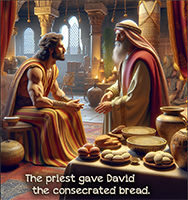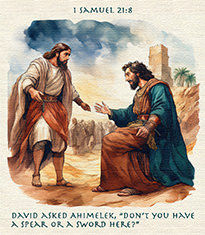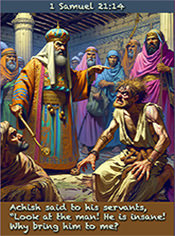1 Samuel 21:1–22:5 . . . Bible Study Summary with Videos and Questions
“David’s Bread, Sword, and Insanity”
We ought to look back for a moment and put chapter 21 into context so we can appreciate its text meaningfully. Saul made numerous attempts on David’s life. Some were concealed, such as offering David one of his daughters in marriage (which required David to act valiantly in war to prove his worthiness as a husband — 18:17–29). Other efforts were more open, such as Saul seeking to run David through with his spear (18:10–12). Finally, Saul gave orders for David to be killed (19:1). As a result of his son Jonathan’s appeal, this order was rescinded for a time (19:1–7), but before long, Saul once again actively sought to kill David. In last week’s summary of 1 Sam. 20:1–42, we learned that Jonathan and David met and devised a plan that would document Saul’s unwavering intent to kill David. This resulted in David fleeing from Saul, and sadly parting from Jonathan (20:42).
We’ll see in chapter 21 that David has become a political refugee, a man without a country. This is a new season in David’s life, a painful time of separation from his wife, from his position in Saul’s employ, and from his beloved friend Jonathan. It’s also a dangerous time, but one in which David, God’s anointed, cannot be killed, no matter how great the danger might become. It’ll be a time of growth and preparation for David, preparing him for the day when he’ll rule over Israel as God’s anointed king.
[Note: Click the link to This Week’s Passage near the bottom of this page to read today’s Scripture.]
David Requests Holy Bread and a Mighty Sword (21:1–9)
From this point on, David was certainly a full-fledged fugitive. He deliberately fled from place to place, thankfully just a few steps ahead of King Saul. The first leg of his flight away from Saul was to the tabernacle of the Lord at Nob, probably about two miles south of his hideout with Samuel in Gibeah, which was Saul’s hometown. The tabernacle, the center of Yahweh worship, had been moved from Shiloh to Nob. Note: Shiloh had been the original location of the tabernacle (Joshua 18:1); it was there that Hannah’s young boy, Samuel, had been raised under Eli the high priest. But when the ark was lost to the Philistines, and Eli’s sons were killed (1 Samuel 4–7), Shiloh was abandoned and apparently destroyed (Psalm 78:60; Jeremiah 7:4, 12–15; 26:6). Although the ark was no longer within the tabernacle at Nob, that town was called “town of the priests.” In the tabernacle, the Bread of the Presence (show-bread) was honorably placed before the Lord weekly (21:6), as prescribed in the Torah (Leviticus 24:5–9). Also within the tabernacle was hung the high priest’s ephod (a sleeveless garment), which contained the Urim and Thummim, used to inquire of the Lord (21:9).
At Nob, David approached Ahimelech the priest. It’s significant that David’s first place of refuge was among God’s chosen representatives on earth. Where else or to whom could David possibly go for refuge or even help? Surely Ahimelek the high priest could be trusted. Because David was well aware of Saul’s influence and his potential for violence, he kept his true purpose for coming to Nob a secret, perhaps thinking he was doing the priest a favor. It didn’t turn out that way, as we’ll see.
Ahimelech trembled when he saw David coming alone, so he questioned him about that. After all, Saul made David the commander of a thousand. If he came to Nob in an official capacity, as he’d done a number of times in the past (see 22:15), his men should have been with him (v. 1). I wonder where his men are, Ahimelech probably wondered. David didn’t answer him truthfully. Instead, he told the priest (v. 2) a ready-made story about Saul having sent him on a secret mission. [Rule Number One about secret missions: Never reveal that you’re on a secret mission!]
Ahimelech was also terrified because, if King Saul discovered that he’d knowingly assisted fugitive David, he’d likely kill him. Therefore, to protect Ahimelech, David made up a story about a sudden secret mission that Saul had sent him on. Ahimelech took David’s words at face value. David figured, if he keeps the priest ignorant, Saul wouldn’t harm him. Alas, David was wrong. He told the priest that he was on special top-secret mission for King Saul, one he couldn’t reveal to Ahimelech. He told him that he wasn’t alone because he’d secretly hidden his men a short distance away. All of this cloak-and-dagger stuff adds importance to the mission, at least in David concept.
Eventually, David revealed the reason for his visiting Nob: He needed provisions. Carrying on with his deception, he told Ahimelech that he needed bread. The only bread that the priest had to offer David was sacred bread, the consecrated show-bread, which was normally eaten only by the priests. Ahimelech did his due diligence to protect the holiness of the bread by asking David if his men were ritually clean, specifically, if they’d had sex, which would have made them ritually unclean until evening (Lev. 15:16–18; Exodus 19:15). David assured him that he and his men were ritually clean so Ahimelech gave him loaves of bread (v. 6) that had been set before the Lord in the tabernacle the previous week.
This account is noteworthy when we realize that Jesus cited this incident when he was questioned about eating grain on the Sabbath (see Mark 2:25–28). The Pharisees had criticized his disciples for plucking some grain heads to munch on as they walked through a wheat field — in itself entirely legal in Jesus’ day. But because this took place on the Sabbath, the Pharisees were classifying this as “harvesting,” which was “work.” Jesus cited this incident as if to say to the legalistic Pharisees: The Bible itself gives examples of flexibility in interpreting the rules. If the great David was allowed to eat of the holy bread, how much more the Son of Man!
However, as Ahimelech gave the sacred bread to David, Doeg the Edomite looked on with great interest. The mention of Doeg, who’d risen high in Saul’s government (v. 7), prepares us readers for his informing Saul about what happened at Nob (22:9–19). It turns out that Doeg was “Saul’s chief shepherd,” who’d been "detained before the LORD," perhaps for some punishment or penance, it’s not revealed. He wasn’t an Israelite, but probably a captive from Saul’s campaign against Edom (14:47). Later, he reported this incident to Saul, with dire consequences! Saul had the priests and their families killed, even though they hadn’t knowingly done anything wrong (22:6–19)!
In addition to asking Ahimelech for food, David then asked him for a sword. Few swords could be found in the entire kingdom, much less in the tabernacle. There was but one sword on the premises, the sword of Goliath, the very sword that David used to obtain his victory over that Philistine giant. The sword was something of a trophy, a memorial of the victory God had given Israel through David. In truth, it already belonged to him, so the priest willingly gave it to him, no doubt wondering why David had come so ill-prepared for battle. David’s excuse was that “the king’s mission was urgent” (v. 8) and he was in such a hurry that he didn’t have time to get his sword or other weapons. This must have produced a puzzled look on the priest’s face, as David’s story was becoming harder and harder to believe. Nevertheless, he gave him Goliath’s sword and David promptly left for Gath.
David Feigns Insanity (vv. 10–15)
David didn’t linger at Nob. We’ll see that his next refuge would also prove to be insecure. For his protection, he hastily fled west to Gath, one of the main Philistine cities. It wasn’t uncommon for a fugitive to seek refuge from a pursuing enemy, so David appealed for asylum from Achish, king of Gath. It’s amazing what David would do in Gath. He’d previously fled from Israel to the land of the Philistines, leaving the people of God for the enemies of God. He sought refuge from King Achish with whom he’d previously battled. And he’d been to Gath before. (Well, almost. After he killed Goliath, the Philistine champion, David and the Israelites pursued the Philistines, killing them right up to the cities of Gath and Ekron [17:51–52]). Now in chapter 21, David approached Gath again; this time as a political refugee seeking asylum from King Achish.
Whatever David’s reasons for going to Gath might have been, it’s quite obvious that God didn’t want him there. So he used Achish’s servants to pressure this Philistine king to take David as a serious threat to Philistine security. Here (and in chapters 27–29), Achish is presented as less than astute, somewhat gullible. Somehow, he took a liking to David, seeming overly confident of David’s submission to him and his value in being his ally. He didn’t willingly entertain thoughts that David might still be a loyal Israelite, soon to take the throne over Israel.
So, Achish was forced to think through his offer to give David sanctuary in Gath. David, too, was thinking about his current predicament. He’d heard the suspecting counsel that the king’s servants gave to Achish. Knowing that if their advice would be taken seriously, he’d be in a lot of trouble, likely be put to death. How could David save his life?
Yes, Achish granted David asylum. All was going well until members of Achish’s court remembered who David really was — an archenemy of the Philistines, the man who in his youth had killed Gath’s own champion, Goliath (17:4). The king’s servants asked aloud, “Isn’t this David, the king of the land? Isn’t he the one they sing about in their dances: ‘Saul has slain his thousands, and David his tens of thousands‘?” (v. 11). At this point, realizing that he was in grave danger, David was resourceful: “He pretended to be insane in their presence; and while he was in their hands he acted like a madman, making marks on the doors of the gate and letting saliva run down his beard” (v. 13). While being resourceful, he was disgusting and pathetic.
Nevertheless, David’s ruse of feigning insanity to Achish worked! He escaped with his life, while losing his dignity. The king concluded that David must have been off his rocker, rather than a genuine threat to him and the Philistine nation. Ironically, Achish’s retort in v. 15, to his servants’ insistent requests to bring David before the king for questioning, also lacked sanity: “Am I so short of madmen that you have to bring this fellow here to carry on like this in front of me? Must this man come into my house?” Achish was happy to be rid of him, and David was happy to escape with his life.
To review, seeking protection and sanctuary, David arrived at Gath, Goliath’s hometown (17:23). Add to that the fact that David was carrying Goliath’s huge and very recognizable sword. If vv. 8–13 tell us anything, it’s obvious how intent Saul was on killing David. If David was forced to seek sanctuary among his &“enemies,” what does this tell us about his “friend,” Saul? This is yet another confirmation of the hostility (albeit insanity) of Saul. Things became desperate indeed for David, Saul, and all of Israel!
David’s Flight from Gath to Adullam (22:1–5)
Chapter 22 starts with further developments of David the fugitive. At the time, Saul was beginning to threaten anyone related to David, including his family in Bethlehem. Crazy with rage, David’s family feared for their lives. So when they heard that David had found a place to hide, they immediately left Bethlehem to join him. Noteworthy family members were his brothers and sisters and their children. In addition, three of David’s nephews, the sons of his sister Zeruiah, turned out to be outstanding warriors in their own right: Joab, Abishai, and Asahel. Since David was one of the youngest sons of his father, Jesse, these nephews may by fairly close to his age.
David’s brothers and other family members left home to meet up with him and his men in a cave in Adullam, a Canaanite city east of Gath, west of Bethlehem. To play it safe, he then took his parents to Moab to maximize their security, asking Moab’s king to keep his folks safe while he was away. But Gad, a prophet, urged David to flee from the cave’s stronghold and go to Judah’s forest because Saul was becoming increasingly paranoid. David and his troupe followed Gad’s recommendation.
As directed, David made his way back to Judah, not too far from Israel’s border with Philistia. He hid in the cave of Adullam (which means “refuge”). It appears that David had found a safe, secluded hideout, far enough away from Gath and not too close to Saul. While hiding out in that cave, a number of people began to arrive, hoping to associate with David. The first to hear of his whereabouts and join him at the cave were his family members who probably sensed that, because David was now regarded as Saul’s enemy, they weren’t safe either. That was a logical assumption, based upon the fate of the priests of Nob (about whom we’ll review next week in 22:6–23). Other people — numbering about four hundred — joined his family members, including those living in distress, in debt, or out of favor with Saul. He’d become the leader of a group of people who, for various reasons, had become discontented with Saul’s government and wanted change.
With the cave becoming outgrown by hundreds, or since David’s whereabouts were becoming too well known, he headed to Mizpah of Moab, to find refuge for his elderly parents (see 17:12) who weren’t safe in Bethlehem because Saul could easily get to them and David, through his family. Neither were they able to keep up with the pace that David and the others were forced to maintain; they weren’t cut out for the life of a fugitive. So David sought a place of refuge for them in Moab. [You may remember that Ruth, David’s great-grandmother, was a Moabite woman (see Ruth 1:4; 4:13–17). This might have inclined the King of Moab to favorably grant David’s request, which would have put David’s parents out of harm’s way during the years he fled from Saul.]
† Summary of 1 Samuel 21:1–22:5
In today’s passage, David flees Saul and enters a period of desperate wandering, depending on God’s provision and encountering both compassion and danger. David first stops at Nob, where the priest Ahimelech, seeing David alone and afraid, provides him with the consecrated bread since there is nothing else — an act of mercy amid David’s urgent need (21:1–6). David also requests a weapon; Ahimelech gives him the sword of Goliath, which had been kept there (vv. 7–9). Doeg the Edomite, Saul’s servant, witnesses this exchange, setting up future conflict (v. 7).
David then flees to Gath, seeking refuge with King Achish, but when the Philistine servants recognize him as the famous Israelite warrior, David acts insane to avoid suspicion and is driven away by Achish (vv. 10–15). He escapes to the cave of Adullam, where his family and others in distress or debt join him, and David becomes their leader (vv. 1–2). Seeking safety for his parents, David entrusts them to the king of Moab in Mizpeh. The prophet Gad, however, warns David not to remain in hiding but to return to Judah, and so David moves on to the forest of Hereth, continuing his flight from Saul (vv. 3–5).
Key points with verse references:
• David comes to Nob, where Ahimelech the priest gives him holy bread and Goliath’s sword (vv. 1–9).
• Doeg the Edomite, Saul’s servant, witnesses David’s visit to Nob, foreshadowing later tragedy (v. 7).
• David flees to Gath and, to save his life, pretends to be insane before Achish, who sends him away (vv. 10–15).
• David gathers his family and those who were distressed, indebted, or discontented at the cave of Adullam, becoming their leader (22:1–2).
• David seeks protection for his parents in Moab, but by the prophet Gad’s direction, returns to Judah and hides in the forest of Hereth (vv. 3–5).
This Week’s Passage
1 Samuel 21:1–22:5
New International Version (NIV) [View it in a different version by clicking here; also listen to chapter 21 narrated by Max McLean].
† Summary Video: “The First Book of Samuel”
† Watch this introductory video clip created by BibleProject on bibleproject.com.
- Q. 1 To which king did David refer in v. 2?
- Q. 2 Why does David lie to Ahimelek? Is he justified or guilty?
- Q. 3 When has “playing dumb” worked for you? . . . How do you honestly face fear?



